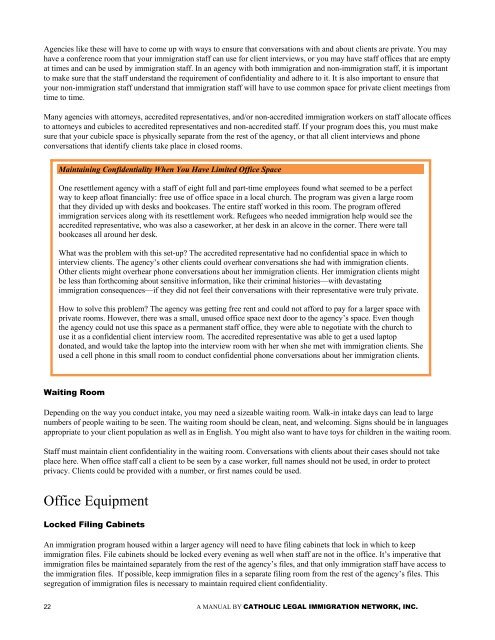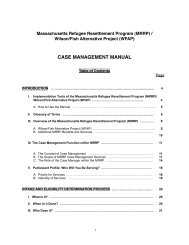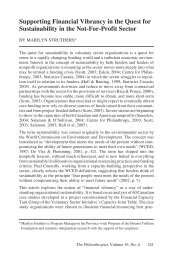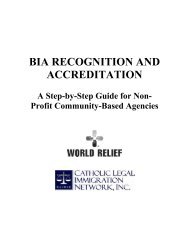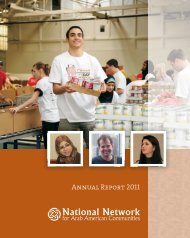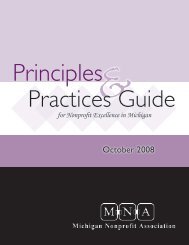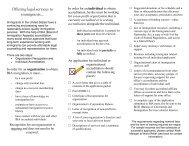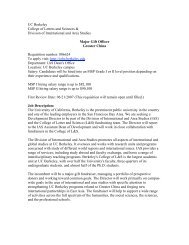Building an immigration legal program - NNAAC
Building an immigration legal program - NNAAC
Building an immigration legal program - NNAAC
Create successful ePaper yourself
Turn your PDF publications into a flip-book with our unique Google optimized e-Paper software.
Agencies like these will have to come up with ways to ensure that conversations with <strong>an</strong>d about clients are private. You may<br />
have a conference room that your <strong>immigration</strong> staff c<strong>an</strong> use for client interviews, or you may have staff offices that are empty<br />
at times <strong>an</strong>d c<strong>an</strong> be used by <strong>immigration</strong> staff. In <strong>an</strong> agency with both <strong>immigration</strong> <strong>an</strong>d non-<strong>immigration</strong> staff, it is import<strong>an</strong>t<br />
to make sure that the staff underst<strong>an</strong>d the requirement of confidentiality <strong>an</strong>d adhere to it. It is also import<strong>an</strong>t to ensure that<br />
your non-<strong>immigration</strong> staff underst<strong>an</strong>d that <strong>immigration</strong> staff will have to use common space for private client meetings from<br />
time to time.<br />
M<strong>an</strong>y agencies with attorneys, accredited representatives, <strong>an</strong>d/or non-accredited <strong>immigration</strong> workers on staff allocate offices<br />
to attorneys <strong>an</strong>d cubicles to accredited representatives <strong>an</strong>d non-accredited staff. If your <strong>program</strong> does this, you must make<br />
sure that your cubicle space is physically separate from the rest of the agency, or that all client interviews <strong>an</strong>d phone<br />
conversations that identify clients take place in closed rooms.<br />
Maintaining Confidentiality When You Have Limited Office Space<br />
One resettlement agency with a staff of eight full <strong>an</strong>d part-time employees found what seemed to be a perfect<br />
way to keep afloat fin<strong>an</strong>cially: free use of office space in a local church. The <strong>program</strong> was given a large room<br />
that they divided up with desks <strong>an</strong>d bookcases. The entire staff worked in this room. The <strong>program</strong> offered<br />
<strong>immigration</strong> services along with its resettlement work. Refugees who needed <strong>immigration</strong> help would see the<br />
accredited representative, who was also a caseworker, at her desk in <strong>an</strong> alcove in the corner. There were tall<br />
bookcases all around her desk.<br />
What was the problem with this set-up? The accredited representative had no confidential space in which to<br />
interview clients. The agency’s other clients could overhear conversations she had with <strong>immigration</strong> clients.<br />
Other clients might overhear phone conversations about her <strong>immigration</strong> clients. Her <strong>immigration</strong> clients might<br />
be less th<strong>an</strong> forthcoming about sensitive information, like their criminal histories—with devastating<br />
<strong>immigration</strong> consequences—if they did not feel their conversations with their representative were truly private.<br />
How to solve this problem? The agency was getting free rent <strong>an</strong>d could not afford to pay for a larger space with<br />
private rooms. However, there was a small, unused office space next door to the agency’s space. Even though<br />
the agency could not use this space as a perm<strong>an</strong>ent staff office, they were able to negotiate with the church to<br />
use it as a confidential client interview room. The accredited representative was able to get a used laptop<br />
donated, <strong>an</strong>d would take the laptop into the interview room with her when she met with <strong>immigration</strong> clients. She<br />
used a cell phone in this small room to conduct confidential phone conversations about her <strong>immigration</strong> clients.<br />
Waiting Room<br />
Depending on the way you conduct intake, you may need a sizeable waiting room. Walk-in intake days c<strong>an</strong> lead to large<br />
numbers of people waiting to be seen. The waiting room should be cle<strong>an</strong>, neat, <strong>an</strong>d welcoming. Signs should be in l<strong>an</strong>guages<br />
appropriate to your client population as well as in English. You might also w<strong>an</strong>t to have toys for children in the waiting room.<br />
Staff must maintain client confidentiality in the waiting room. Conversations with clients about their cases should not take<br />
place here. When office staff call a client to be seen by a case worker, full names should not be used, in order to protect<br />
privacy. Clients could be provided with a number, or first names could be used.<br />
Office Equipment<br />
Locked Filing Cabinets<br />
An <strong>immigration</strong> <strong>program</strong> housed within a larger agency will need to have filing cabinets that lock in which to keep<br />
<strong>immigration</strong> files. File cabinets should be locked every evening as well when staff are not in the office. It’s imperative that<br />
<strong>immigration</strong> files be maintained separately from the rest of the agency’s files, <strong>an</strong>d that only <strong>immigration</strong> staff have access to<br />
the <strong>immigration</strong> files. If possible, keep <strong>immigration</strong> files in a separate filing room from the rest of the agency’s files. This<br />
segregation of <strong>immigration</strong> files is necessary to maintain required client confidentiality.<br />
22 A MANUAL BY CATHOLIC LEGAL IMMIGRATION NETWORK, INC.


